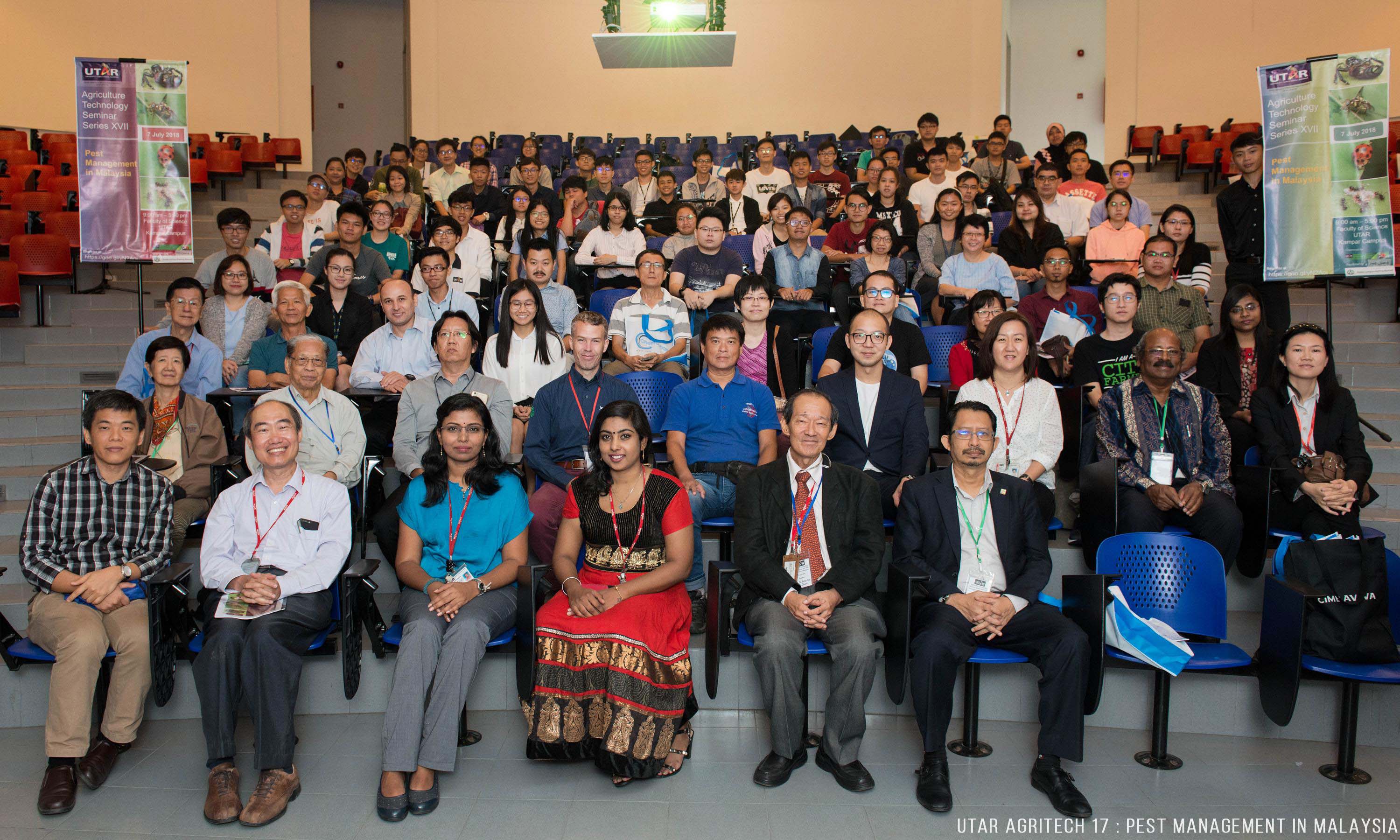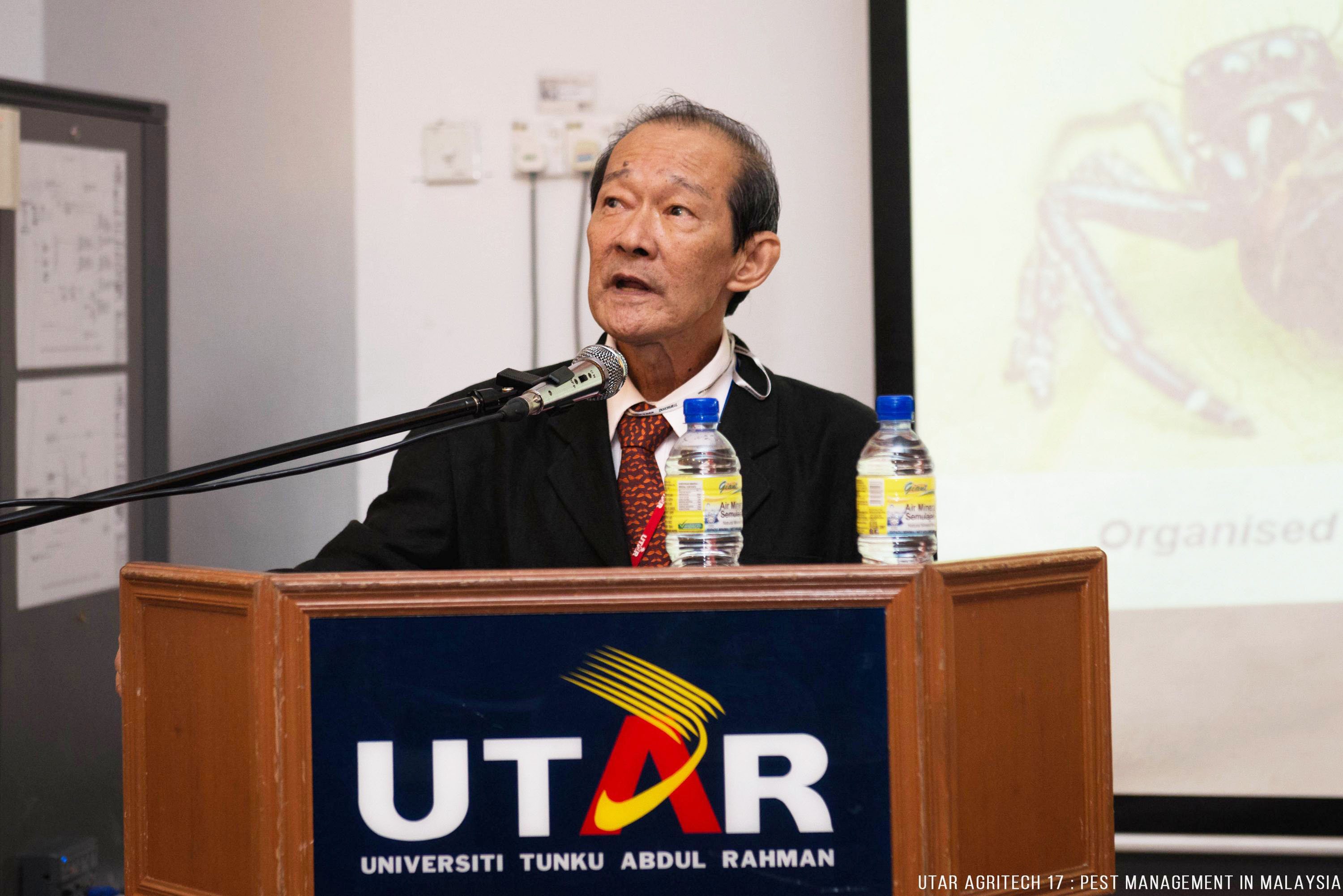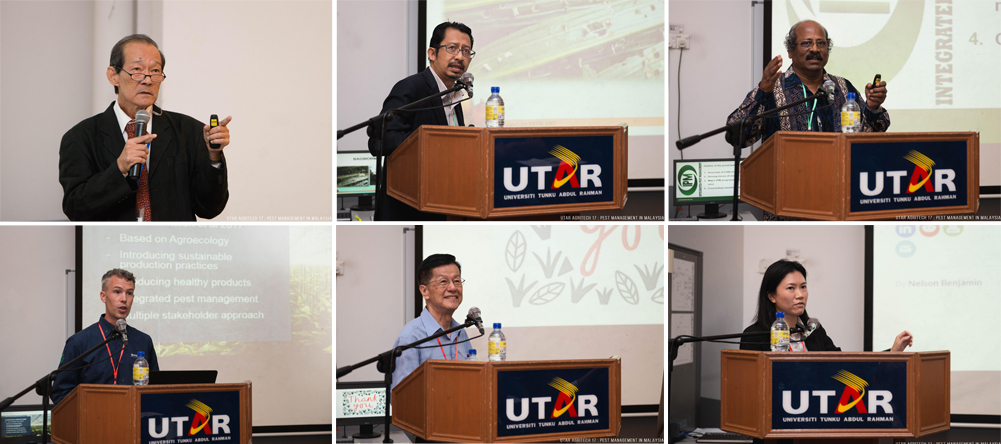


Speakers, organising committee and participants of the seminar
Held for the 17th time, the Agriculture Technology (AgriTech) Seminar Series took place on 7 July 2018 at Kampar Campus. It was co-organised by the Centre for Biodiversity Research (CBR), Faculty of Science (FSc) and Institute of Postgraduate Studies and Research (IPSR).
This year’s seminar noted the importance of increasing the agricultural production to meet the growing global demands. Hence the theme ‘Pest Management in Malaysia’ aimed to address the reduction of agricultural yield caused by pests. The seminar also aimed to expand the knowledge of scientists, farmers and industry players via discussions on the use of chemicals for pest control, criteria to choose the right pest control measures and ways to produce safe foods for the consumers.

Prof Ooi delivering his speech
Organising Chairperson Prof Dr Peter Ooi Aun Chuan, in his welcome speech, emphasised the need for citizens to have a better understanding on pest management while ensuring that the environment stays protected and is able to produce healthy food for the consumers. He stressed for ongoing researches and continuous learning to be conducted on pest management. He also highlighted that having sufficient understanding of this issue will help to promote sustainable agriculture. He then thanked the speakers for sharing their knowledge and experiences.
Prof Ooi, who was also the first speaker for the morning session, shared the “Overview of Pest Management in Malaysia”, and elaborated on the two major causes of outbreaks of insect pest in Malaysia. He exemplified the first cause with the outbreak that severely affected an oil palm in the 1950s. Due to the outbreak, a British Entomologist was hired to study the causes of the outbreaks and the results concluded that highly toxic insecticides were the cause for the pest outbreak. As a result, toxic insecticides were restricted from oil palm estates and that encouraged the natural enemies of the pests to do their jobs. The second cause was reflected in the case of the diamond-backed moth in Cameron Highlands. He explained the seriousness of the insecticide resistance, which led to two parasitoids being introduced from New Zealand. From the second incident, participants learnt that organic farming of crucifer was possible in the highlands.
Following that, Moderator Academician Emeritus Prof Dr Yong Hoi Sen introduced the second speaker, Biological Research Department Director of Malaysian Palm Oil Board (MPOB) Dr Norman Hj Kamarudin to present his research titled “Sustainable Management on Oil Palm Pests and Diseases in Malaysia”. On noting that bagworms, rhinoceros beetle, bunch moth and termites are among the major insect pests in oil palms, he explained that sustainable management of the insect pests with long-term effects is now practised by most plantations. He elucidated that integrated pest management (IPM) approach of census and detection followed by the application of Bacillus thuringiensis or selective pesticides, planting of beneficial plants for natural enemies and mass trapping could possibly reduce the population of bagworms without endangering the environment.
The participants also learnt that during replanting, good agricultural practices, such as planting of cover crops, proper management of biomass residues and the use of microbes such as Metarhizium have been practised successfully to control rhinoceros beetle. MPOB has also introduced the Integrated Ganoderma Management (IGM) to find the solution for the disease which includes sanitation, biological control, fertiliser with beneficial (trace) elements and chemical control. He emphasised that increase efforts in these areas would ensure better management of pests and disease for a sustainable and long-term control of pest and diseases in oil palm.
The third speaker, Centre for Agriculture and Biosciences International (CABI) Regional Director Dr Sivapragasam Annamalai, presented his research titled “Integrated Pest Management: Regional Experiences in Southeast Asia”, which broadly examines the nexus between agricultural production in Southeast Asia (sea), the role of pesticides and IPM.
He explained that IPM focuses on biological control as its core component and has largely served as an important tactical approach against the indiscriminate use of pesticides. It was understood that the approach had fulfilled the needs of the farming community in SEA in a number of pesticide-induced environments such as pest outbreaks. Despite the numerous IPM endeavours, Dr Sivapragasam highlighted that there are major challenges that remain to be addressed. The challenges he listed included inadequate problem definition leading to poor project design, inappropriate research which fails to design technologies suited to small farmers, fragmentation of effort within a country and ill-suited government policies which favour pesticide use.
The afternoon session saw Moderator Dr Tan Swee Lian introducing the fourth speaker, Technical Manager for Koppert Biological Systems, Netherlands Dr Bart de Graaf, who presented on “Integrated Pest Management”.
He discovered that throughout the agricultural sector in Malaysia, the disproportionate use of agro-chemical leads to widespread pollution of the natural environment and puts farmers’ and farm workers’ health at risks. He suggested using IPM as one of the solutions. He then elaborated on the definition of IPM and the components of the system that claim to make agriculture healthier and more sustainable. He also spoke about the benefits of IPM for the growers and reasons for growers to adopt IPM. He highlighted that one of the major factors in the success of IPM is biological control, which is using natural enemies to help growers reduce the amount of agro-chemicals significantly.
Speaker and FSc lecturer Dr Ong Ching Ang presented the “Overview of Management of Plant Pathogens in Malaysia”, which highlighted the need to maintain the balance of nature, more specifically the sustainability of agriculture while managing plant pathogens in the agroecosystem.
He enlightened the participants with the three broad approaches that were used to manage plant pathogens, namely environmental manipulations, host manipulations and pathogen manipulations. His presentation also reviewed some local examples of the management of viruses Chilli veinal mottle virus and Rice tungro virus complex; bacterium Candidatus Liberibacter asiaticus [hualongbing]; and fungus Microcyclus ulei [South American leaf blight].
The final speaker Entomologist and Agronomist of Advanced Agriecological Research Sdn Bhd Dr Teo Tze Min, presented her research titled “R&D Activities in Pest Management”. Her focus is to research for safer chemicals and alternative ways of controlling pest populations. She also mentioned that understanding the population dynamics in the agriecosystem is important for effective integrated pest management and that emerging pests are also vigilantly monitored and studied to find effective ways of control.
James Lawrence Teh Cheng Jin, who is a farmer himself, has been attending the seminar series for the past two years. He mentioned that the seminar had enabled him to learn more about farming. “I learnt new things again; I learnt about pathogens and the transmission of diseases. I also gained knowledge to understand pest management. I am able to use the right methods for farming and better understand the risks involved,” said Teh.
Meanwhile, Technical and Sales Executive of Farmcochem Sdn Bhd Lim Jia Yang mentioned that the seminar had enabled him to understand better on the usage of chemicals for pest management, while establishing a good network with other external participants.
The end of the seminar saw FSc Dean Assoc Prof Dr Lim Tuck Meng delivering his closing speech. He thanked all the speakers for sharing their knowledge and also thanked the participants and sponsors for their support towards the seminar.
“I am very happy to see the organising committee being so passionate to continue organising this seminar series. It has become a meeting place for researchers, industry players, students and the public to learn more about agriculture. For the students in particular, I hope they will gain a better understanding and have practical ideas to think about their future career development,” said Dr Lim.

Moderators of the seminar, Prof Yong (left) and Dr Tan

Speakers of the seminar (clockwise from top left): Prof Ooi, Dr Norman, Dr Sivapragasam, Dr Teo, Dr Ong and Dr Bart
![]()
© 2019 UNIVERSITI TUNKU ABDUL RAHMAN DU012(A).
Wholly owned by UTAR Education Foundation Co. No. 578227-M LEGAL STATEMENT TERM OF USAGE PRIVACY NOTICE